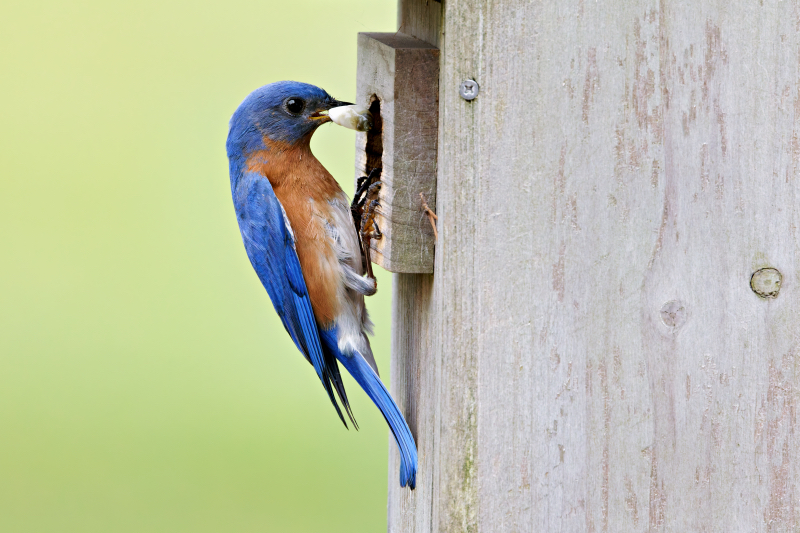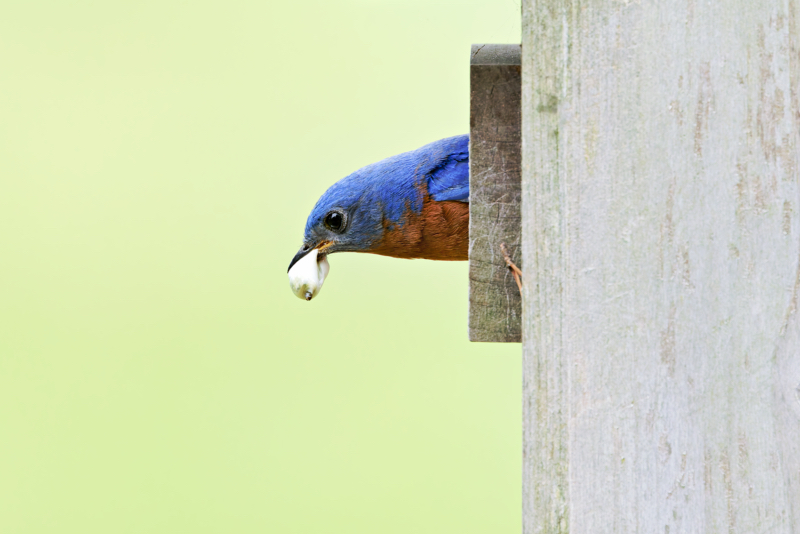We’ve been following the amazing journey of the Eastern bluebird family in my backyard. From witnessing their hatch day on the day of the eclipse to their dedication in feeding their chicks during a rainy Arkansas day, it’s been a truly special experience.
Today, we delve into a fascinating, yet not-so-glamorous, aspect of chick rearing – fecal sac removal. While it may not be the most pleasant topic, it’s a crucial part of keeping the nest clean and the chicks healthy.

Frequent Flyers: Removing Waste After Every Meal
Eastern bluebird parents are champions of nest hygiene. Unlike some bird species, they are incredibly diligent in removing fecal sacs produced by their young. These sacs, a sort of “birdie diaper,” contain the waste products of the nestlings. After every feeding, the parent bird will promptly remove the sac, keeping the nest environment sanitary.
Growing Appetite, Growing Waste
As the chicks grow larger, their little bodies become more efficient at processing food. This translates to a higher frequency of waste production, which means even more work for the busy parents. They need to increase their trips to the nest to keep up with the growing waste volume.
Taking Out the Trash: Disposal Strategies
Once the parent removes the fecal sac from the nest, where does it go? Thankfully, not back into the cozy nest! Typically, the parent will fly a short distance away and either drop the sac or, believe it or not, consume it! This behavior helps to keep the nest area clean and free of waste that could attract predators or harbor disease.
Some particularly dedicated bluebird parents have been observed carrying the fecal sacs for quite a distance before disposing of them. This extra effort ensures the waste is deposited further away from the vulnerable nestlings.
Cleanliness is Next to Chick-liness: The Importance of Fecal Sac Removal
Removing fecal sacs is more than just keeping the nest tidy; it’s essential for the health of the chicks. A clean environment reduces the risk of harmful bacteria, parasites, and pathogens that could make the chicks sick. Additionally, a clean nest is less attractive to predators who might be drawn to the smell of accumulated waste.
A Remarkable Adaptation
The diligent fecal sac removal behavior of Eastern bluebird parents is a remarkable adaptation that ensures the health and survival of their offspring. It’s a fascinating example of how birds, and all living things, have evolved unique strategies to thrive in their environments.

For a more in-depth look at this topic, check out my other blog posts [Eastern Bluebirds Eat Fecal Sacs, Eastern Bluebirds: Fecal Sac Removal and Fecal Sac Being Removed].
Stay tuned for more updates on the Eastern bluebird family as their chicks continue to grow and prepare to fledge!
